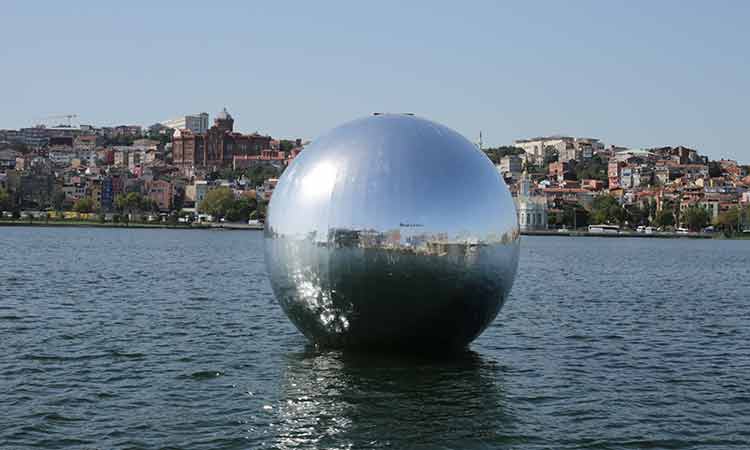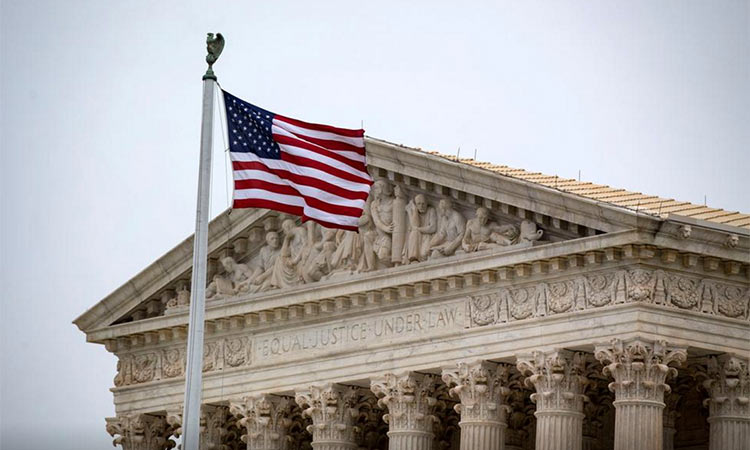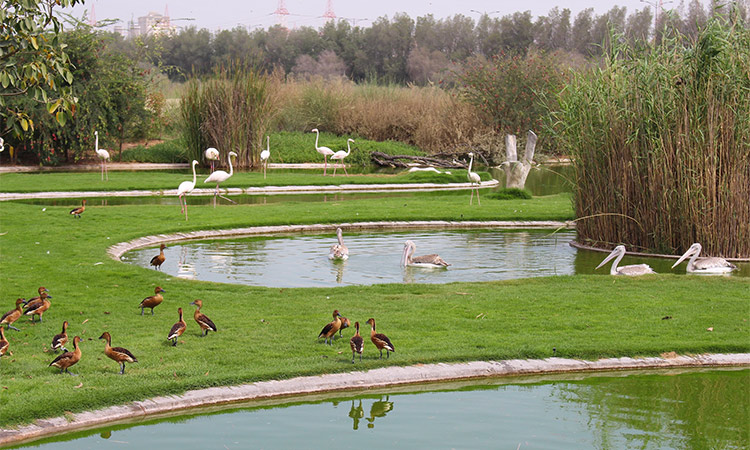Erdogan suffers stunning defeat
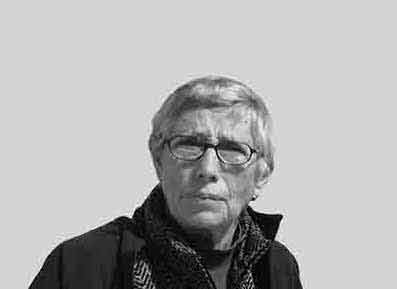
Michael Jansen
The author, a well-respected observer of Middle East affairs, has three books on the Arab-Israeli conflict.
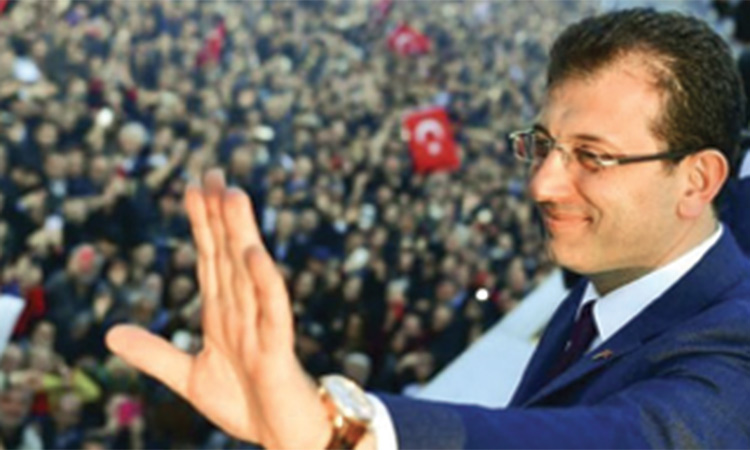
Ekrem Imamoglu attends a rally in Istanbul. File/AFP
His cheerful campaign slogan, proposed by a boy at a rally, was, “Everything will be all right.” This impressed depressed Turks with his personal optimism and positive message at a time everything is not all right in Turkey, which is suffering from a severe economic and financial crisis.
Imamoglu’s family hails from the Black Sea region. Born in 1970 in a town west of Trabzon, he grew up in rural communities until his family moved to Istanbul in 1987. After studying business administration at Istanbul University, he worked in his family’s construction firm. He joined the Republican People’s Party (CHP) in 2008 and in 2009 he was chosen as president of the party’s chapter in his own middle-class district of the city where, in 2014, he defeated the AKP candidate in the election for local mayor. Nominated in December 2018 by the CHP for mayor of the vast metropolis, he won twice despite constant attacks in the media, 90 per cent of which is controlled by the government.
Losing Istanbul amounted to a stunning blow for Erdogan who began his political career as mayor of the city 25 years ago. The result of the June 23rd poll was particularly humiliating because Erdogan had challenged the March election, which Imamoglu had won by 13,000 votes, with the expectation of an AKP win. Instead, Imamoglu triumphed with 800,000 votes. To make matters worse, Turks living abroad or enjoying domestic holidays returned home to cast ballots for Imamoglu. Erdogan’s lower middle-class and working class strongholds voted for Imamoglu rather than the AKP’s high profile candidate, former Prime Minister Benali Yildirim. Erdogan was stunned into silence for an hour after Yildirim conceded defeat. The president has often said, “Whoever wins Istanbul, wins Turkey.”
Others have replied by saying, “Whoever loses Istanbul, loses Turkey.” Istanbul is the country’s largest city, with a population of 16 million out of a total population of 83 million. The hub of Turkey’s economic life, Istanbul accounts for one-third of the country’s GDP and dominates foreign trade. Turkey’s top ten companies are based in Istanbul. A cosmopolitan city, Istanbul is Turkey’s cultural capital and academic centre. Istanbul is eighth in the world among tourist destinations.
Although he congratulated Imamoglu on his success, Erdogan cannot be trusted. Ahead of the election, his government enacted new regulations aimed at bypassing the mayor by strengthening the authority of district municipalities and allowing them to make appointments to municipal firms. Imamoglu responded by saying such measures violated laws governing local government. “We are prepared even for the most risky situations,” he stated and urged Erdogan to cooperate.
While holding out an olive branch of peace, Imamoglu has also armed himself with ammunition to do battle with Erdogan. During his brief stint as mayor during March and April, Imamoglu vowed to secure all the files of his AKP predecessors. “The time of serving ‘the man,’ associations, persons, foundations and religious groups has ended,” he stated shortly after the March 31st poll. “We will start such a transparent administration that, everything, including my mayorship will be made public.”
It is, however, not clear how deep he and his staff managed to penetrate the Istanbul database as a court order was issued to ban Imamoglu and his staff from downloading files. Other municipalities were also told that their databases had to be transferred to the central government and they would have to apply to Ankara for admission. Erdogan’s objective was to deny information on large-scale nepotism and corruption during the AKP’s 17-year rule.
During April, Deutsche Welle reported that the Istanbul municipality had provided $146 million to AKP-connected institutions and associations, with the two largest beneficiaries being educational foundations where Erdogan’s son, Bilal, and daughter Sumeyye, hold sway. They received $13.2 and $9.1m, respectively. A technology non-governmental organisation headed by Erdogan’s son-in-law, Selcuk Baraktar, was third with $7m in municipal funding. Other finance was also provided to AKP-affiliates.
Once Erdogan became prime minister in early 2003, he promoted economic growth spurred by the construction sector, which flourished, transforming Turkey into West Asian “tiger.” However, his economic boom did not last. Since growth depended on heavy borrowing by Turkey’s major firms, banks and financial institutions, fearing huge losses, have called in loans. Construction companies have halted projects. Foreign currencies have fled the country, prompting the central bank to set the short-term interest rate at 24 per cent with the aim of keeping money in the country. The value of Turkey’s lira fell by more than 40 per cent and inflation rose to 19 per cent. Unemployment stands at 14 per cent. Turkey’s debt in foreign currencies has reached $328 billion payable this year.
At the end of 2013, rampant corruption was exposed by the AKP’s ally, a popular faith-based movement founded by US-resident cleric Fetllah Gulen. Erdogan responded by arresting “Gulenists” in the security agencies, police, judiciary, civil service, and educational institutions. His crackdown intensified after dissident military officers staged a failed coup in mid-2016. Since then hundreds of thousands of people have been arrested or sacked from their jobs and opposition to Erdogan’s rule crushed.
It is significant that Imamoglu’s election coincided with the opening of the trial of 16 organisers of the 2013 country-wide protests against Erdogan’s widely criticised plan to construct a mosque and a tourism centre in Istanbul’s only green space, Gezi park.
While Erdogan remains powerful, his entourage is made up of loyalists who capitulate without comment to his one-man rule, and the AKP appears to be fracturing. His predecessor as president, Abdullah Gul, and former prime minister Ahmet Davutoglu have announced that they will launch a breakaway faction of the AKP, undermining the unity of the party that has dominated Turkey’s turbulent political system since 2002.
Optimists claim Imamoglu’s election could restore a semblance of democracy to the country and pave way for Turks to end Erdogan’s one-man rule through the ballot box rather than by military intervention.
(1$ = Dhs3.67)


